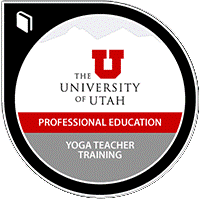Yoga Teacher Training Certificate

- Meet Yoga Alliance 200 hour teacher training requirements
- Earn a valuable credential backed by the prestige of the University of Utah that will increase your chances of success in the competitive job market
- Includes opportunity to practice teaching via a partnership with a local yoga studio
- Can be completed in as little as one semester
This noncredit certificate will prepare students to become a yoga instructor. The certificate courses meet the Yoga Alliance 200 hour teacher training requirements for the Registered Yoga Teacher (RYT) credential. The curriculum includes the following topics: history and purpose of yoga study, energies and philosophies of yoga study, anatomy and physical practice of yoga, yoga as a business and the teaching of yoga.
This certificate is offered in collaboration with the Exercise and Sport Science Fitness in the Kinesiology Department in the College of Health. These collaborative noncredit certificates utilize existing for-credit classes and as such, have unique application requirements which are described in the information below.
The certificate includes three separate classes, one of which is a participative workshop held at a local yoga studio. Students will have an opportunity to practice teaching during the certificate.
Certificate Program Outcomes
- Trace the history and purpose of Yoga Study, with a focus on yoga sutras, upanishads, the Bhagavad Gita, and the lineage of modern yoga practices.
- Describe how to apply the 8 limbs of Yoga, Doshas, Koshas, Prana Vayus, Chakras, and other metaphysical aspects of yoga practice.
- Prepare for the variety of differences between people and students through knowledge of various styles of yoga (pregnant, injured, recovery, age, body types, etc.).
- Differentiate between teaching methodologies and styles, emphasizing the teaching of physical alignment, observation of students in order to cue their practice accordingly to their needs, and the creation (and instruction) of a sequenced class.
- Analyze the business aspects of YTT, including a social media presence, further training, the need for personal insurance, and using YTT as a form of income.
Who Should Attend
This certificate is open to a wide variety of students, including college students, working professionals, athletes, stay-at-home parents, and fitness professionals.
Although a basic understanding of a yoga class is helpful, being an advanced practitioner of yoga is not needed. This training is designed to give a student all the skills he/she needs to understand the premise of yoga and how to lead a class on their own.
This program is open to dedicated yoga practitioners, aspiring yoga teachers, and individuals who wish to deepen their understanding of yoga and its transformative potential. Program also suits those wanting to gain skills related to starting a yoga related business or those wishing to train in Yoga Therapy at some point.
The noncredit Yoga Teacher Training Certificate utilizes three existing courses currently offered with Exercise and Sport Science Fitness in the Kinesiology Department in the College of Health. This course is offered for-credit as well, visit the College of Health Yoga Teacher Training page for those details.
Required Noncredit Courses:
- ESSFC 800: Yoga Teacher Training 1 (meets with ESSF 1800)
- ESSFC 801: Yoga Teacher Training 2 (meets with ESSF 1801)
- ESSFC 802: Yoga Teacher Training 3 (meets with ESSF 1802)
Class format: ESSFC 800 and ESSFC 801 are offered in a hybrid format, while ESSFC 802 is offered online.
Enrollment options: all classes are offered every term and held over the traditional 15 week semester period
Course sequencing: ESSFC 800 should be taken before or concurrently with ESSFC 801 and ESSFC 802
Average Time to Complete: the certificate can be completed in as little as one semester, but students must complete the program within 2 semesters.
Certificate Requirements: While it is not necessary to be an advanced practitioner, familiarity with the basics is required in order to fully benefit from this program. Students must have at least 3 months of experience practicing yoga to participate in this program.
Q: I don’t have much yoga experience. Is it necessary to have a lot of experience if I enroll in Yoga Teacher Training?
A: Extensive experience practicing yoga is not required, but some experience is. This can be personal practice, taking a class, or joining a group. It can be difficult for students with no experience to learn to teach others, so we ask for 3 months minimum experience before registering for the Yoga Teacher Training certificate.
Q: Are there any class prerequisites needed?
A: ESSFC 800 must be completed before, or concurrently with ESSFC 801. ESSFC 802 is open to all as it is a workshop style class, designed to introduce a variety of yoga styles to the average student.
Q: What requirements for enrolling in your YTT program are most important to know?
A: Attendance is our biggest requirement, and is the basis of earning a “Satisfactory” grade. This is a program after all, not a typical yoga class. Our syllabus goes into more specific detail about this, but 100% attendance should be your goal! If you know beforehand that you would be out of town for more than 2 class times, recognize your work schedule may consistently interfere with arriving to class on time, have extenuating circumstances such as pressing family needs or severe health issues, please consider enrolling when you know you can fully participate. A maximum of 2 unexcused absences per course is allowed before an “Unsatisfactory” grade must be assigned.
Q: What if I don't finish all the required out-of-class hours the training requires during the semester I am enrolled in?
A: As per Yoga Alliance standards of a 200 hour training, contact hours (instruction with a master teacher) and non contact hours (out-of-class hours) are how you receive a yoga teaching certificate. A student has up to a year after the semester of their enrollment for that course to complete the out-of-class hours needed to qualify receiving their YTT certification. We want to make sure a student feels confident and comfortable teaching a yoga class on their own, before they receive their certificate.
The Yoga Teacher Training Certificate requires three courses that are offered over a time frame comparable to a traditional semester schedule, with fixed start and end dates. These noncredit courses meet with for-credit sections.
ESSFC 800
Course includes a guided focus on history of yoga, philosophies, and the metaphysical energies associated with yoga practice. These principles will include, but are not limited to: lineage of yoga, the Eight Limbs, chakras, koshas, doshas, bandhas, pranayamas, etc.; the study of anatomy, adjustments, asanas; readings of Bhagavad Gita, Yoga Sutras, Upanishads; guided meditations, kriyas, bhaktis, and much more.
ESSFC 801
This is a practicum course in which the principles taught in ESSFC 800 are expanded and applied in active exercises with other students. Critique and discussion is included.
Both ESSFC 800 and 801 include a unique overview of "Yoga Teaching as a Business" including the following key topics:
- Social media for small businesses and the self-employed
- Marketing and communication tactics
- Sustainability for small businesses
- Self-employment 101
- Risk and insurance - what small business owners need to know
- Making a living as a yoga instructor
ESSFC 802
This class is a series of yoga workshops and guest lectures, where students new or experienced with yoga, get to encounter a wide variety of yogic styles. Workshops are taught by seasoned yoga instructors.
This class can be taken first in the sequence and is a great introduction to Yoga Teacher Training for those unsure of pursuing the full certificate.
Solo Teaching Requirement
Students must teach 10 hours of classes as a solo instructor, which can start during the semester or extend beyond it. Students have up to a year after enrollment to compete this requirement should confidence and practice of the student still be needed.
The solo classes need to be taught and observed by YTT staff and is considered a student's "final exam". This requirement must be met for satisfactory completion of the certificate and to qualify for the 200 hour YTT credential.
University of Utah YTT instructors provide support, assistance and opportunities to meet this requirement.
Certificate Director - Rebecca Davenport
Rebecca Davenport has been practicing yoga since 2000, certifying in 2007 with her 200 hour RYT from Flow Yoga SLC. She continued training in NYC, completing her 300 hour RYT with Pure, TriBeCa, and Shanti Yoga studios, and is a certified 200 hour E-RYT instructor through Yoga Alliance. She also holds certifications in Reformer Pilates, Barre Fitness, and TRX disciplines.
Ms. Davenport continues to expand the depth the U's Yoga Teacher Training (YTT) program offers prospective student teachers, to deliver an effective and comprehensive training that will support a new yoga instructor's further professional development. She has been the Lead Instructor and developer for the U of U's Yoga Teacher Training program since 2016.
The total cost of the certificate, including tuition and fees, is $2,880. Tuition is due at the beginning of each course offering a convenient pay-as-you-go option. Each course costs $960 ($925 tuition + $35 special fees) as of Fall 2025. Textbooks are additional costs. Tuition listed above subject to change without advance notice. Special fees cover the use and maintenance of required equipment for the class.
- This course is not eligible for faculty/staff tuition reduction or emeritus benefits.
- Financial aid is not available for non-credit classes. Students are encouraged to inquire with their employers to determine if tuition assistance is available.
- Payment plans are not available for this program.
- Students may drop this class for a refund up until the “Last date to drop” on the Academic Calendar.
Why choose the University of Utah?
We understand that you have a choice when it comes to taking professional development courses and we work hard to earn your trust with each and every class!
By selecting the University of Utah, you’ll enjoy the following benefits whether you’re coming to us as someone new to the job market, a career changer, a seasoned professional or a lifelong learner.
Resume Power - benefit from the University of Utah reputation for credibility and quality. Choosing the University of Utah for your certificate program makes a clear statement about your commitment to excellence.
Instructor Excellence - learn from the same high-quality faculty that teach in our degree programs.
The Power of the U Network – students have access to a valuable University of Utah peer and faculty network.
Programs that Fit Your Schedule – most of our certificates offer convenient online or evening classes that offer a schedule that works around you. Go to class whenever and wherever you want.
How to register for an Academic Noncredit Certificate
- Register on this webpage, using the “Begin the Certificate Here” button above
- By registering, you are declaring: 1) your intention to complete the full certificate curriculum within the 2 semester requirement, and 2) that you have at least 3 months experience with yoga.
- This certificate is not open to students admitted to the University of Utah as a matriculated (degree-seeking) or non-matriculated (non-degree seeking) student.
Deadlines and other important application information
- Registrations are accepted on an ongoing basis. For planning purposes, please register at least one month prior to the start of the semester. Registrations received within 5 working days of the start of the semester may not be able to start the program on time.
- All classes for this certificate start at the beginning of each semester
- Find information about the University of Utah academic calendar.
- Applicants can expect to receive information about their registration within 3 days of submission.
- Applicants are asked not to register for courses prior to being admitted into the certificate program. Details about how to register for classes will be included in all new student information.
- Students wishing to take courses individually and not as part of a certificate, do not need to submit a certificate registration and may register for classes through Academic Noncredit programs. Note that these classes cannot be applied towards a certificate at a later date. Some courses may not be offered for non-certificate seeking students.
Certificate Completion Requirements
- Students will be required to fulfill the same expectations and requirements as matriculated students including exams, projects and participation.
- Certificate students will receive an “S-Satisfactory” or “U-Unsatisfactory” assessment for each class. “S-Satisfactory” will indicate that the student has met the standards for at least a C-.
- Students must receive an “S-Satisfactory" grade in all classes for successful completion.
How is my accomplishment recognized?
For students earning an “S-Satisfactory" grade, the completed certificate will appear on University of Utah official transcripts.
Students will also be awarded a University of Utah digital credential (badge) that can be shared on social media sites and used with other professional resources. Digital badges are embedded with metadata that validate the skills demonstrated and other requirements for earning the badge.Digital Credentials / Badges

 Follow the link on the badge to the left to find out what metadata is behind the Yoga Teacher Training Certificate or Caring for the Aging Population Micro-certificate badge. This is an example of the type of information you’ll find behind all our academic noncredit certificates.
Follow the link on the badge to the left to find out what metadata is behind the Yoga Teacher Training Certificate or Caring for the Aging Population Micro-certificate badge. This is an example of the type of information you’ll find behind all our academic noncredit certificates.
Find out more about Digital Badges at the University of Utah »
Are there exams? Am I graded?
Certificate classes are graded with a "satisfactory" or "unsatisfactory" option. For successful certificate completion, students must achieve a "satisfactory" grade in all classes.
Can I apply these classes to a degree at the University of Utah?
This certificate is noncredit and cannot be applied to any for-credit degree.
Is there a minimum or maximum number of courses a student may take in a semester?
There is no minimum or maximum number of courses a student may take in a semester. The certificate must be completed within two (2) semesters.
Will I have flexibility in what classes I take and when?
Once admitted, students are responsible for enrolling in individual classes on their own through Continuing Education Academic Noncredit. Students may consult with the certificate program manager if they have questions about specific courses (See "Contact Us" section).
Are these classes eligible for federal financial aid?
Students pursuing a certificate are considered "non-degree seeking," a status that is not eligible for federal student aid loan programs.
What is the average weekly time commitment for each of the classes?
You can expect to spend 3-5 hours outside of class per week, per course you are enrolled in.
Noncredit Certificates Program
Contact Noncredit Certificates Program for questions about certificate requirements, completion process, class registration or payment issues.
Taylor Bond
Certificates and Contracts Coordinator
certificates@utah.edu
(801) 581-7912
Department of Exercise and Sport Science Fitness, Kinesiology
Contact the Department of Exercise and Sport Science Fitness for questions about class experience and flow, pre-requisites, or any class-specific information.
Rebecca Davenport
Director, Yoga Teacher Training Program
(801) 581-7373
R.Davenport@utah.edu
ESSF@utah.edu
Upcoming Classes
| Class Title | Next Start Date |
|---|---|
| Yoga Teacher Training 1 | 01/05/2026 |
| Yoga Teacher Training 2 | 01/05/2026 |
| Yoga Teacher Training 3 | 01/05/2026 |

